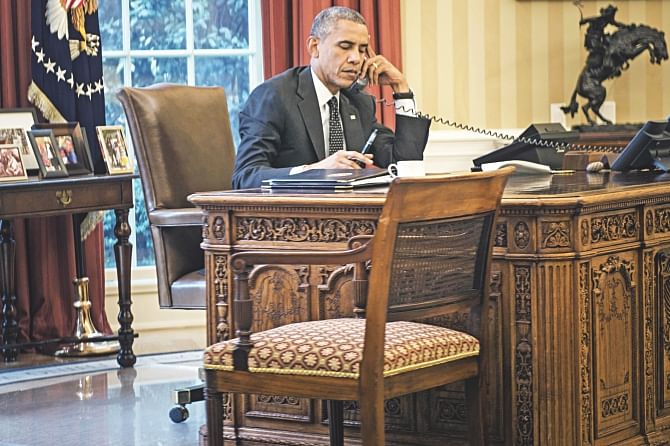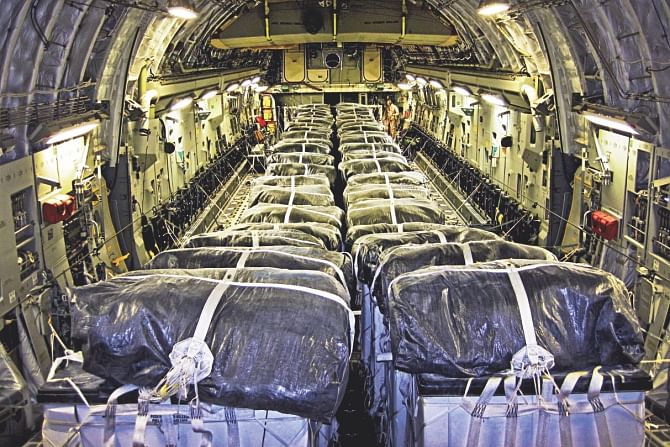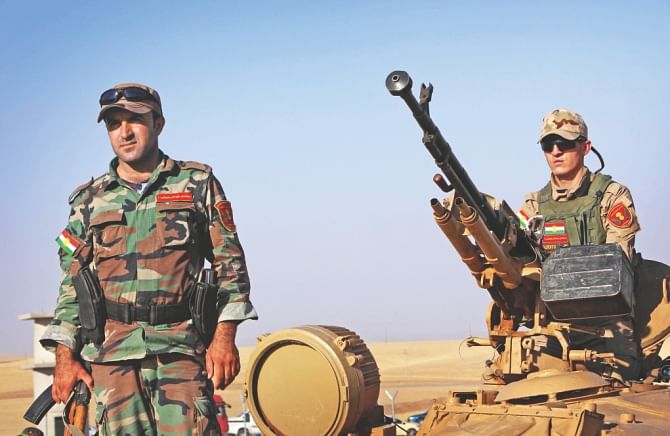Tackling Iraq's insurgency will take time: Obama

President Barack Obama yesterday said US airstrikes had destroyed arms that Islamic State (IS) militants could have used against Iraqi Kurds, but warned there was no quick fix to a crisis that threatens to tear Iraq apart.
Speaking the day after US warplanes hit militants in Iraq, Obama said it would take more than bombs to restore stability, and criticised Prime Minister Nuri al-Maliki's Shia-led government for failing to empower Sunnis.

"I don't think we're going to solve this problem in weeks. This is going to take some time," Obama told a news conference in Washington.
Obama also vowed to help rescue thousands of civilians besieged by jihadists on an Iraqi mountain.
US and Iraqi aircraft have air dropped food and water to the thousands of people, many of them members of the Yazidi minority, who have been stranded on Mount Sinjar since they fled Islamic State attacks on their homes a week ago.

Amid reports that the children and elderly among them were already dying, Obama justified the decision to intervene Thursday with the risk of an impending genocide against the Yazidis.
The Yazidis, who worship a figure associated with the devil by many Muslims, are a small and closed community, one of Iraq's most vulnerable minorities.
Islamic State militants have threatened to kill more than 300 Yazidi families in the villages of Koja, Hatimiya and Qaboshi unless they change religion, witnesses and a Yazidi lawmaker told Reuters yesterday.

Obama said he had received "strong support" from British Prime Minister David Cameron and French President Francois Hollande, who had both agreed to provide humanitarian assistance.
Islamic State has captured wide swathes of northern Iraq since June, executing non-Sunni Muslim captives, displacing tens of thousands of people and drawing the first US air strikes in the region since Washington withdrew troops in 2011.
After routing Kurdish forces this week, the militants are just 30 minutes' drive from Arbil, the Iraqi Kurdish capital, which up to now has been spared the sectarian bloodshed that has scarred other parts of Iraq for a decade.
The US president said Washington would continue to provide military assistance and advice to Baghdad and Kurdish forces, but stressed repeatedly the importance of Iraq, which is a major oil exporter, forming its own inclusive government.
Maliki has been widely criticised for authoritarian and sectarian policies that have alienated Sunnis and prompted some to support the insurgency.
The US Defense Department said two F/A-18 warplanes from an aircraft carrier in the Gulf had dropped laser-guided 500-pound bombs on Islamic State artillery batteries. Other air strikes targeted mortar positions and an Islamic State convoy.
Obama has said the action was needed to halt the Islamist advance, protect Americans in the region as well as hundreds of thousands of Christians and members of other religious minorities at risk.
Given the Islamic State threat, a source in the Kurdistan Regional Government said it had received extra supplies of heavy weaponry from the Baghdad federal government "and other governments" in the past few days, but declined to elaborate.
A top official in the autonomous region said the time had come for a fightback.
"Following the US strikes, the peshmerga will first regroup, second redeploy in areas they retreated from and third help the displaced return to their homes," Fuad Hussein told reporters Friday in the Kurdish capital Arbil.
In their latest advance through northern Iraq, the Islamic State seized a fifth oil field, several towns and Iraq's biggest dam, sending tens of thousands fleeing for their lives.
The territorial gains of Islamic State, who also control a third of Syria and have fought this past week inside Lebanon, has unnerved the Middle East and threatens to shatter Iraq, a country split between mostly Shias, Sunnis and Kurds.

 For all latest news, follow The Daily Star's Google News channel.
For all latest news, follow The Daily Star's Google News channel. 



Comments